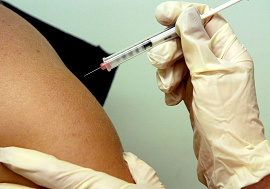Allergy Shots
Call 911 if any reactions happen after leaving our clinic! Reactions are listed on page 2.
How Can Allergy Shots Help?
Allergy shots make you less likely to have allergy symptoms by building up the body’s defenses. The shots are based on the results of allergy tests that show what is causing the allergy symptoms. The shots take 6 to 12 months to start working. There may still be allergy symptoms even after the shots start working. The shots may decrease the signs of allergies like:
- Itchy eyes and nose
- Sneezing
- Watery eyes
- Nose congestion or stuffiness
- Coughing
- A runny nose that is clear, not cloudy
Who Should Get Allergy Shots?
- People with allergies to pollen, molds, dust mites, pets or stinging insects.

- Skin or blood tests show there are allergies
- Allergens cause wheezing or breathing problems
- Allergy medicine does not help or there are side effects from these medicines
- Avoiding allergy triggers does not help
Allergy Shots Should Not Be Given if You Are Sick or if Your Asthma Is Acting Up.
Do not come for your shot if you are sick. You will not get it. Cancel your visit by calling the clinic. You should reschedule for when you are feeling better. This is done for your safety.
If beta blocker medicine is being taken for high blood pressure, migraines, or eye drops for glaucoma, you may not be able to get a shot. Common names for these medicines are: Propranolol, Metoprolol, Atenolol, Timoptic or Betoptic.
How Are the Shots Given?
- The shot is given in the upper part of the arm. 1 or more shots may be given at a visit.
- Sometimes reactions can happen after a shot. It is very important to stay in the clinic for 30 minutes after each shot. You must see the nurse before you leave. A healthcare provider may need to take care of more serious reactions in the clinic.
- Before leaving the clinic a nurse will check for any reactions.
- A serious reaction will mean a longer stay in the clinic.
- Future allergy shots will not be given if you:
- Do not stay in the clinic for 30 minutes after a shot.
- Are not checked by the nurse before leaving the clinic.
- Have missed 3 shot visits or are often late for your visits.
How often are allergy shot visits?
At first, shots will be given at least 1 time a week. The strength of the shots will start very low and go up at each visit until full strength is reached. It may take 6 to 18 months to reach this strength.
Full strength shots will be needed every month.
How Long Are Allergy Shots Needed?
Allergy shots work best if taken at full strength for 3 to 5 years.
What Reactions Can Happen After the Shot?
Reactions can be seen right away or minutes after a shot.
Mild Reactions can happen at the site of the shot on the arm.
- It can be red, swollen, itchy or painful.
- If the area gets bigger after leaving or lasts more than 24 hours, tell clinic staff.
Serious Reactions do not happen often, but can lead to death if not treated.
Reactions may happen after any shot with no warning.
Tell the clinic staff right away if you have any of the following signs or symptoms:
Hives: Rash, swelling or itching of more than one part of the body.
Swelling: Any part of the body, inside or out. This includes the mouth, tongue and throat. It can be one or many parts of the body.
Breathing problems: Shortness of breath, coughing, wheezing or chest tightness.
Other: Sneezing, dizziness, sick stomach or just not “feeling right”.
Anaphylactic shock is a mix of these symptoms and is the most serious allergic reaction
If there is a serious or anaphylactic reaction, a shot of emergency medicine called epinephrine will be given.
If a reaction happens, a visit with a provider is needed before another shot visit.
By signing the consent form, you are giving the providers permission to give allergy shots and treat any reactions.



